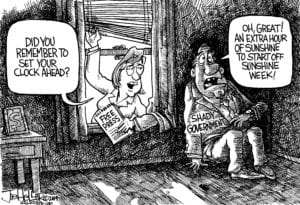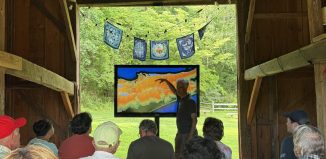Celebrating open information laws on Long Island
By Donna Deedy
It’s Sunshine Week (March 10-16), time for recognizing and celebrating the importance of freedom of information laws and open government in our democracy.
Newsrooms nationwide are participating in the weeklong event, which specifically aims to help people better understand their everyday right-to-know under federal and state laws. Sponsored since 2005 by The Reporters Committee for Freedom of the Press and the American Society of News Editors, TBR News Media is joining in for this year’s tribute.
We’re focusing on New York State’s Freedom of Information Law. First enacted in 1974, the law succinctly states: “The people’s right to know the process of governmental decision-making and to review the documents and statistics leading to determinations is fundamental to our society. Access to such information should not be thwarted by shrouding it with the cloak of secrecy or confidentiality.” The law applies to schools and all government entities within the state.
We’ve taken a look at the websites of towns and villages within our circulation area on Long Island’s North Shore to gauge whether or not the process is user-friendly.
What we’ve found is most entities acknowledge their obligation to respond to Freedom of Information Law, or FOIL, requests. The towns of Huntington, Smithtown and Brookhaven post their record access codes online, along with most incorporated villages. Rather than posting their FOIL codes, the villages of Huntington Bay, Nissequogue, Head of the Harbor and Port Jefferson simply provide a link to a one-page preprinted FOIL request form. Port Jefferson village online code explicitly directs the public to visit Village Hall during business hours to examine its record access policy.

It’s important to note that state legislators created a special unit within New York State to answer the public’s questions and render legal opinions about open government practices. The unit, known as the Committee on Open Government, has determined government entities should not mandate the use of record request application forms.
Villages that currently require the public to use their application forms to request records may need to revise their practices to align with state’s legal advisory opinions.
“There’s no obligation on behalf of the requester to travel to town or village offices to view records,” said Robert Freeman, the executive director of New York State Committee on Open Government.
Fortunately, requesting records in the electronic age is easier than ever. If documents aren’t already posted online, people can simply request copies of records via an email to the record access officer. Instructions can be found on the state department’s website: https://www.dos.ny.gov/coog/freedomfaq.html#howrequestemail. The record request template clearly outlines requesters basic rights within the form letter.
Christian Trejabal is the open government chair for the Association of Opinion Journalists. In a blogpost for Sunshine Week he opined on the need for journalists in this day and age.
“Thousands of newspapers have closed over the last 20 years,” Trejabal said. “Tens of thousands of journalists have lost their jobs. Without them, government is under less scrutiny, and that isn’t healthy for democracy.”
If you would like to know more, visit the New York Department of State Committee on Open Government website. It provides volumes of information about the Freedom of Information Law, the Open Meetings Law and the Personal Privacy Protection Law. The committee’s lawyers can also be reached by telephone at 518-474-2518.
Donna Deedy is currently a freelancer for TBR News Media, and has years of experience in the journalism field.







